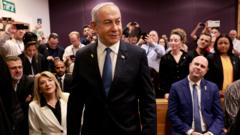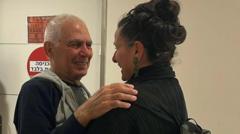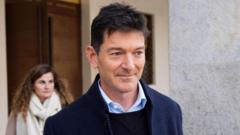Prime Minister Benjamin Netanyahu made history as Israel's first sitting leader to testify in a corruption trial, contending charges of bribery, fraud, and breach of trust amidst ongoing military conflict.
Netanyahu Takes Stand in Historic Corruption Trial Amid Ongoing Conflict

Netanyahu Takes Stand in Historic Corruption Trial Amid Ongoing Conflict
Israeli Prime Minister Benjamin Netanyahu faces serious allegations as he defends himself in court during a tumultuous time in the country.
In an unprecedented moment for Israeli politics, Benjamin Netanyahu took the witness stand on Tuesday for his corruption trial while simultaneously managing a seven-front war as the prime minister. Aiming to portray the proceedings as politically motivated, Netanyahu and his lawyer Amit Hadad accused prosecutors of conducting a "witch hunt" rather than investigating actual criminal activity.
The leadership of Netanyahu, Israel's longest-serving prime minister, faces scrutiny over allegations that he exchanged regulatory favors with media owners for positive coverage, and accepted lavish gifts—including expensive champagne and cigars—from a Hollywood producer in return for promoting personal interests.
In Tel Aviv court, Netanyahu expressed his frustration with mainstream media's treatment of him as "absurd," pushing back against suggestions that the gifts were anything but friendship gestures. Standing through his testimony, he stressed the connection between his government's actions and national security, asserting that he couldn’t choose between his political responsibilities and defending his integrity.
The trial, initially held in Jerusalem but relocated due to security concerns, is being closely followed. In the wake of violence and political instability, supporter and protestor dynamics have escalated outside the courtroom, with public figures and ordinary citizens expressing sharply divided views on Netanyahu's leadership. Prominent ministers showed solidarity with the Prime Minister, emphasizing the importance of maintaining a functioning government during a time of crisis.
However, critics, some of whom were outside the court, slammed Netanyahu for prioritizing his defense over his responsibilities towards hostages held by Hamas and the wider population. They argue that the ongoing legal battle has had serious implications on the nation’s stability.
As Netanyahu’s trial unfolds, it underscores deep divisions within Israel, especially during a conflict that has reignited long-standing tensions domestically and in the region. The proceedings are expected to draw on many weeks of court appearances, adding complexity to Netanyahu’s dual role as leader and defendant. With no clear end in sight, the trial may continue to dominate the Israeli political landscape for years to come.






















